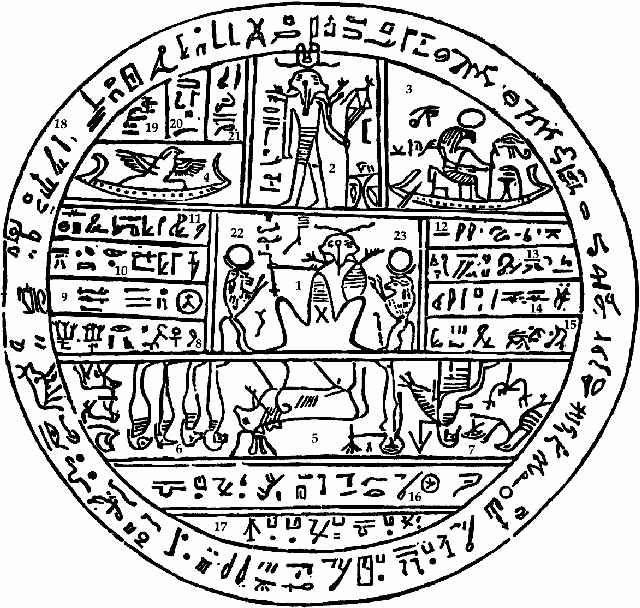
Donald N. Yates is a Georgia native of Choctaw-Cherokee and Sephardic Jewish descent. He earned a Ph.D. in classical studies at the University of North Carolina at Chapel Hill before teaching at the University of Notre Dame and elsewhere. In 2003, he founded DNA Testing Systems. His latest book, Old Souls in a New World, is about an expedition of Greeks, Jews and Egyptians that inadvertently founded the Cherokee Indian nation in the third century B.C. He lives in Phoenix. |
1 posted on
07/07/2010 6:22:17 AM PDT by
Palter
Navigation: use the links below to view more comments.
first previous 1-20, 21-33 last
To: Palter
35 posted on
07/07/2010 8:30:26 AM PDT by
Grampa Dave
(ILLEGAL IMMIGRATION IS DESTROYING AMERICA-LOOK AT WHAT IT DID TO THE WHITE HOUSE!)
To: Palter
To: Palter
Ok, I am sorry. I could not get past the headline - laughing to hard.....doubled over sides hurting. hahahhaah!
38 posted on
07/07/2010 9:02:58 AM PDT by
svcw
(True freedom cannot be granted by any man or government, only by Christ.)
To: colorcountry; Colofornian; Elsie; FastCoyote; svcw; Zakeet; SkyPilot; rightazrain; ...
Wow, Mormon much? This is so much wishful thinking and bad history/lingusitics it isn’t even funny.
What is also odd, considering my connections in Classics and with UNC-CH, I have NEVER heard of the guy and classics is a small field. Makes me think he is a fringe guy rather than an accepted academic.
Also notice that he doesn’t mention he is LDS, just lists his credentials making him look like a real scholar.
But THIS is a dead giveaway that he is LDS: His latest book, Old Souls in a New World, is about an expedition of Greeks, Jews and Egyptians that inadvertently founded the Cherokee Indian nation in the third century B.C.
39 posted on
07/07/2010 9:11:07 AM PDT by
reaganaut
(ex-mormon, now Christian - "I once was lost but now am found, was blind but now I see")
To: Palter
My apologies for what I’m about to say, but this is pure foolishness, and this “scholar” ought to be ashamed of himself. I’m no linguist, but I have a few years of Greek under my belt, and I also right now am studying Iroquoian languages—of which Cherokee is a member.
Their grammars are COMPLETELY different. As in COMPLETELY. Greek is, like the other Indo-European languages, an inflected language with a root stem on which suffixes are then added: anthropos, anthropoi, anthropou, etc. Cherokee, on the other hand, is an agglutinative language, where the root is buried in the middle of the word. I had difficulty learning Mohawk (which is distantly related to Cherokee) precisely because it wasn’t anything like the Latin/Greek/Italian/French grammars I was used to. It’s a completely different paradigm. Take something as simple as the subject/object of a verb. Greek marks the subject of verbs with a suffix—the object takes a separate word entirely. Iroquoian does it with a huge system of prefixes which have not only the subjects but also the objects embedded in them.
Second, I *guarantee* you, with a corpus of 10000 words between two languages—no matter what those languages are—you will find a few dozen words that look similar and have similar meanings. But he barely even did that: “ouktenna = something not killed” vs. “Uktena name of a dangerous dragon or serpent”? Astronomical instrument and Great Hawk? No serious linguist would take such comparisons seriously.
To prove common descent, you need much much more than a few look-alike words. You need regular variation with established sound laws: like N in one language regularly shows up as T in the other language. Moreover, you have to show it in the most basic, elementary words that are least likely to change as time goes on. Like numbers. Pronouns. Sun, moon, mouth, eye, man, woman, water. Show me comparisons with those words, with regular sound laws. Show me a similar grammar, and then we can talk about common descent.
If Cherokee was descended from Greek, we’d see much much more similarity between them. There is actually very very little. English and Sanskrit are way closer to Greek than Cherokee is.
In short, this article is dead wrong.
42 posted on
07/07/2010 9:38:53 AM PDT by
Claud
To: nutmeg
45 posted on
07/07/2010 9:42:21 AM PDT by
nutmeg
(Another "smartass" for lower taxes)
To: Palter
And their DNA has been linked to Asia.
So this proves what?
I thought Mr. Yates would want to prove there was a link to Hebrew.
His last name is a common one in Utah. I’m just guessing by his ridiculous supposition that he is indeed one.
Any bets?
To: Palter
Cherokees Spoke Greek and Came from East Mediterranean SURE they did!

51 posted on
07/07/2010 10:50:13 AM PDT by
Elsie
(Heck is where people, who don't believe in Gosh, think they are not going...)
To: Palter
His latest book, Old Souls in a New World, is about an expedition of Greeks, Jews and Egyptians that inadvertently founded the Cherokee Indian nation in the third century B.C. SURE they did!

52 posted on
07/07/2010 10:53:46 AM PDT by
Elsie
(Heck is where people, who don't believe in Gosh, think they are not going...)
To: Palter
Did the Greeks come from America or visa versa?
Or perhaps they were both descendants of a more ancient culture? Atlantis?
59 posted on
07/07/2010 12:25:18 PM PDT by
wolfcreek
(http://www.youtube.com/watch?v=Lsd7DGqVSIc)
To: Palter

“’Cause you, you’re part eggplant.”
65 posted on
07/07/2010 1:45:27 PM PDT by
RichInOC
(No! BAD Rich! (What'd I say?))
To: blam
75 posted on
07/07/2010 3:45:07 PM PDT by
SunkenCiv
("Fools learn from experience. I prefer to learn from the experience of others." -- Otto von Bismarck)
To: Palter
I have a pretty good paper trail back to a Cherokee woman
Hannah (Ianhanna) Poe 1780-1871
But when we conducted DNA testing, the MtDNA Haplogroup was T
Since if was not the typical A, B, C, D, or X I thought our paper trail must be wrong, or there was an unknown adoption, or a European woman had married into the tribe.
But it seems that there are a fair number of T MtDNA Haplogroups in northeastern US tribes.
More scoop about us at:
http://harlandna.blogspot.com
Our Haplogroup T
HVR1 Mutations
T16126C, A16129G, T16187C, C16189T, T16223C, G16230A, T16278C, C16294T, C16296T, C16311T
HVR2 Mutations
C146T, C152T, C195T, A247G, 522.1A, 522.2C, 309.1C, 315.1C
91 posted on
09/15/2014 2:59:11 PM PDT by
craighullinger
(MtDNA Haplogroup T - With Paper trail to Cherokee woman)
Navigation: use the links below to view more comments.
first previous 1-20, 21-33 last
FreeRepublic.com is powered by software copyright 2000-2008 John Robinson



